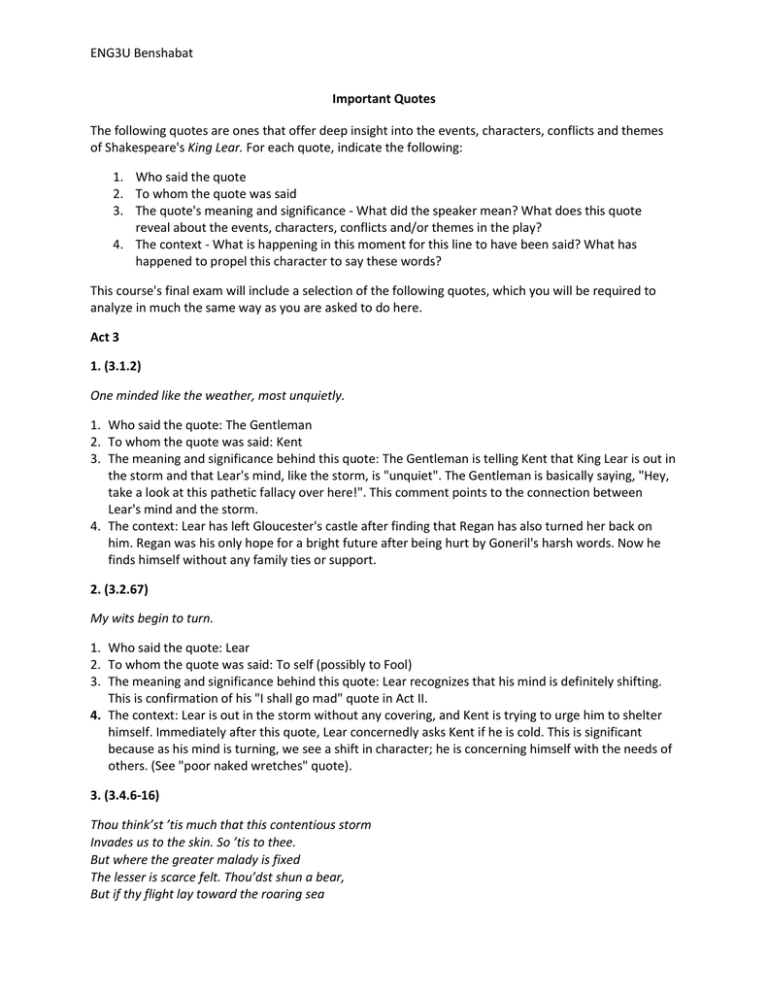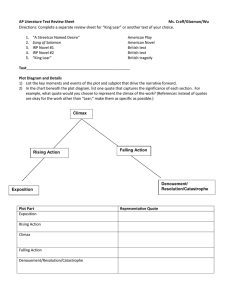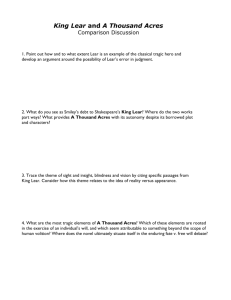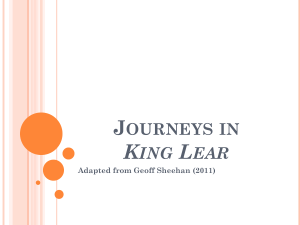ENG3U Benshabat Important Quotes The following quotes are ones
advertisement

ENG3U Benshabat Important Quotes The following quotes are ones that offer deep insight into the events, characters, conflicts and themes of Shakespeare's King Lear. For each quote, indicate the following: 1. Who said the quote 2. To whom the quote was said 3. The quote's meaning and significance - What did the speaker mean? What does this quote reveal about the events, characters, conflicts and/or themes in the play? 4. The context - What is happening in this moment for this line to have been said? What has happened to propel this character to say these words? This course's final exam will include a selection of the following quotes, which you will be required to analyze in much the same way as you are asked to do here. Act 3 1. (3.1.2) One minded like the weather, most unquietly. 1. Who said the quote: The Gentleman 2. To whom the quote was said: Kent 3. The meaning and significance behind this quote: The Gentleman is telling Kent that King Lear is out in the storm and that Lear's mind, like the storm, is "unquiet". The Gentleman is basically saying, "Hey, take a look at this pathetic fallacy over here!". This comment points to the connection between Lear's mind and the storm. 4. The context: Lear has left Gloucester's castle after finding that Regan has also turned her back on him. Regan was his only hope for a bright future after being hurt by Goneril's harsh words. Now he finds himself without any family ties or support. 2. (3.2.67) My wits begin to turn. 1. Who said the quote: Lear 2. To whom the quote was said: To self (possibly to Fool) 3. The meaning and significance behind this quote: Lear recognizes that his mind is definitely shifting. This is confirmation of his "I shall go mad" quote in Act II. 4. The context: Lear is out in the storm without any covering, and Kent is trying to urge him to shelter himself. Immediately after this quote, Lear concernedly asks Kent if he is cold. This is significant because as his mind is turning, we see a shift in character; he is concerning himself with the needs of others. (See "poor naked wretches" quote). 3. (3.4.6-16) Thou think’st ’tis much that this contentious storm Invades us to the skin. So ’tis to thee. But where the greater malady is fixed The lesser is scarce felt. Thou’dst shun a bear, But if thy flight lay toward the roaring sea ENG3U Benshabat Thou’dst meet the bear i' th' mouth. When the mind’s free, The body’s delicate. The tempest in my mind Doth from my senses take all feeling else Save what beats there. Filial ingratitude! Is it not as this mouth should tear this hand For lifting food to ’t? But I will punish home. 1. Who said the quote: Lear 2. To whom the quote was said: Kent 3. The meaning and significance behind this quote: Lear says that the storm does not faze him because even though the storm is horrendous, it shies in comparison to the pain incflicted upon him by his daughters. He makes an analogy: Imagine a bear were to attack you and the only way that you could avoid the bear is to face the ocean. If this were the case, you would face the bear rather than the ocean. He also claims that when your mind is unsettled, your body feels nothing, but when your mind is calm, your body then feels pain. He briefly comments on his madness and finishes this speech by crying out against "filial ingratitude" (his family's ungratefulness) and vowing to punish his daughters, somehow. 4. The context: Kent is struggling to get Lear out of the storm and into the hovel to take cover. Like the last quote, this quote is also followed by Lear being concerned about the Fool being cold. We see Lear urge the Fool to take shelter before he does. 4. (3.4.28-36) Poor naked wretches, whereso'er you are, That bide the pelting of this pitiless storm, How shall your houseless heads and unfed sides, Your looped and windowed raggedness, defend you From seasons such as these? Oh, I have ta'en Too little care of this! Take physic, pomp; Expose thyself to feel what wretches feel, That thou mayst shake the superflux to them And show the heavens more just. 1. Who said the quote: Lear 2. To whom the quote was said: Lear/The poor people in the world 3. The meaning and significance behind this quote: Lear is concerned about the poor people of England. as he wonders how they are faring in this storm without any clothes or fat on their bones. He laments that he did not take good care of those in need when he had the power to do so. He also cries to those currently in power, imploring them to put themselves into the situations the poor are in so that they may truly understand the needs of the homeless. Yet again, we see Lear caring for the needs of others. His madness is seeming to bring him a new found clarity and empathy. His horrible situation has also put him in the position to deeply understand the pains of the poor. 4. The context: Just prior to this quote, Lear is urged by Kent to take shelter, to which Lear urges the Fool to go first. Immediately after this quote, Poor Tom (Edgar) appears from the hovel, reinforcing and manifesting the emotional considerations Lear had just made about the poor. ENG3U Benshabat 5. (3.5.19-22) [Aside.] If I find him comforting the King, it will stuff his suspicion more fully. [Aloud.]I will persevere in my course of loyalty, though the conflict be sore between that and my blood. 1. Who said the quote: Edmund 2. To whom the quote was said: Self and then Cornwall 3. The meaning and significance behind this quote: The Aside reveals Edmund's intention/hope of catching his father helping Lear. He feels that if he is able to catch his father in the act of being a traitor, he will be able to prove his story and gain more of Cornwall's trust. Edmund then speaks aloud to Cornwall, reassuring him of his loyalty and desire to catch his traitorous father despite his familial bond. This Aside/Aloud shows the true nature of Edmund as he shares his desire to turn his back on his father while also putting on a face of wholesomeness for Cornwall to gain his trust. 4. The context: Edmund has just told Cornwall that Gloucester knew that France had landed in England with the intent of waging war, and that Gloucester intended on helping Lear despite Cornwall and Regan's explicit instruction not to. 6. (3.6.83) ...We'll go to supper i' the morning. 1. Who said the quote: Lear 2. To whom the quote was said: Fool 3. The meaning and significance behind this quote: This line is obviously nonsensical; no one has supper in the morning. This nonsense signifies that Lear's mind is truly gone and indicates for the Fool that Lear is too far gone to be helped. Immediately after this line, the Fool gives his final line of the play and is never "needed" again, thereafter. 4. The context: Lear had just finished holding a mock trial for his daughters, where he hallucinated that a pair of stools were his treacherous daughters. The trial demonstrates how mad Lear has become. By this quote, he has finally agreed to sit down and rest. 7. (3.6.101-114) When we our betters see bearing our woes, We scarcely think our miseries our foes. Who alone suffers suffers most i' the mind, Leaving free things and happy shows behind. But then the mind much sufferance doth o'erskip When grief hath mates, and bearing fellowship. How light and portable my pain seems now When that which makes me bend makes the King bow. He childed as I fathered. Tom, away! Mark the high noises and thyself bewray When false opinion, whose wrong thoughts defile thee, In thy just proof repeals and reconciles thee. What will hap more tonight, safe scape the King! ENG3U Benshabat Lurk, lurk. 1. Who said the quote: Edgar 2. To whom the quote was said: Self 3. The meaning and significance behind this quote: After watching Lear's episode of hallucinating a mock trial and seeing how his mind and life have crumbled into pieces, Edgar feels great sorrow and empathy. He recognizes that while he has a horrible situation, he is humbled by seeing someone of higher stature suffering from a far worse situation. Comparatively, he feels that he does not have it as bad as Lear, and his heart breaks for the pain that the old man is suffering. He ends by hoping that Lear will have a safe journey to Dover. This soliloquy showcases Edgar good character and his ability to feel empathy for others. 4. The context: Lear has just finished holding a mock trial for his daughters. Gloucester has also just come in with news about there being a plan to kill Lear and that Lear must be taken to safety in Dover. 8. (3.7.88-91) Out, treacherous villian! Thou callest on him that hates thee. It was he That made thy overture of thy treasons to us, Who is too good to pity thee. 1. Who said the quote: Regan 2. To whom the quote was said: Gloucester 3. The meaning and significance behind this quote: Regan is mocking Gloucester for calling on Edmund for help. She reveals to Gloucester that Edmund hates him and that Edmund was the one who revealed Gloucester's treachery. 4. The context: Gloucester's eyes have just been plucked out by Cornwall and Gloucester is calling on his son, Edmund, to help him.






